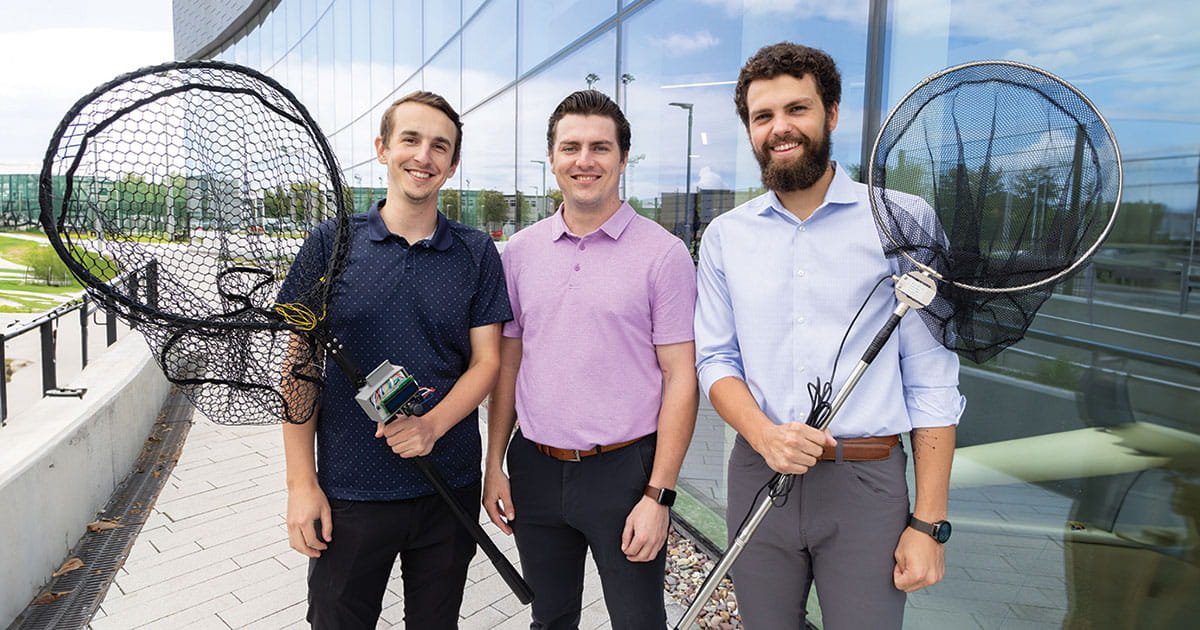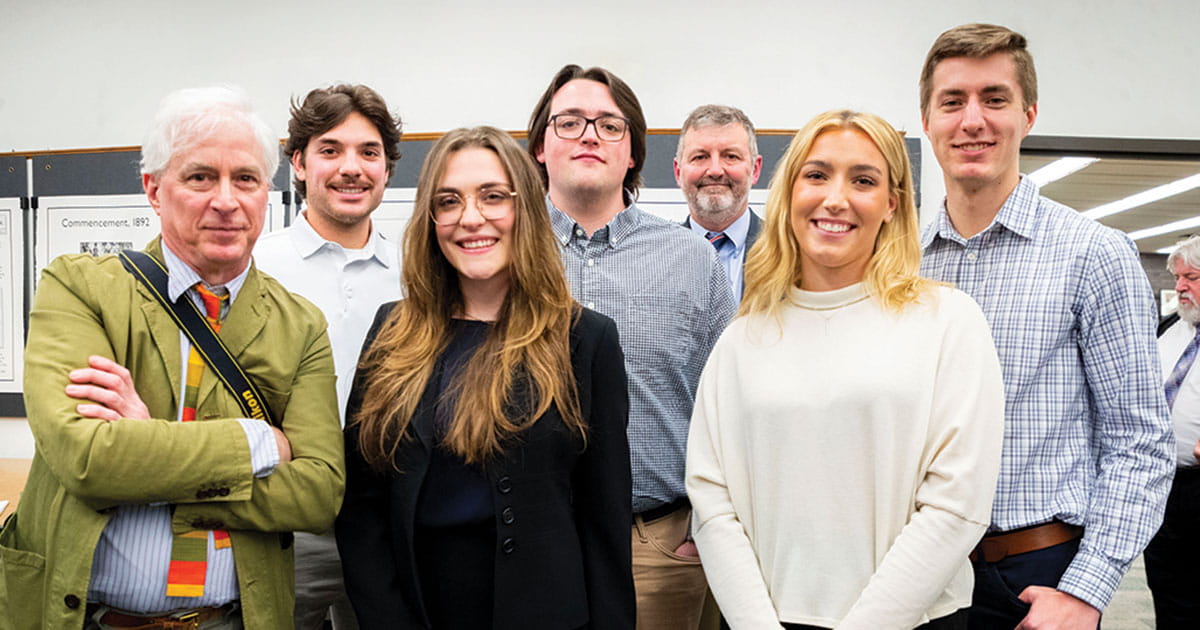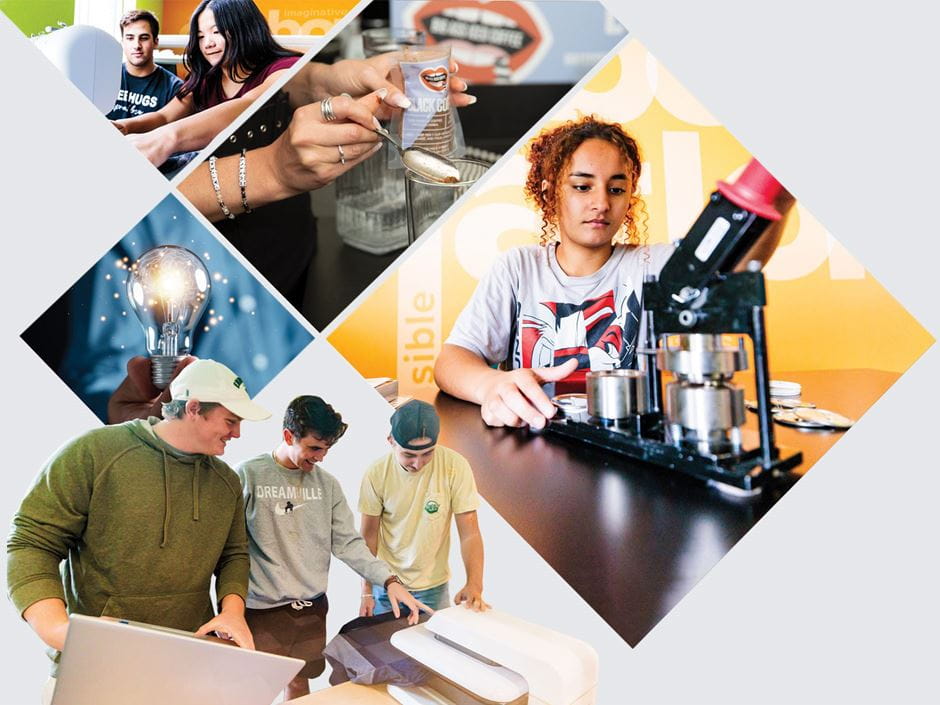Last semester, Gina Deschamps, Executive Director of the Colin & Erika Angle Center for Entrepreneurship, launched the first session of her Intro to Entrepreneurship class by asking for a show of hands: “Who here has ever been told by somebody that you aren’t creative?” she asked students.
Nearly every hand shot up.
Going around the classroom, she pressed deeper. “Who told you that? It’s not true.”
Deschamps spent the rest of the semester convincing the students that, contrary to what previous educators or even a parent might have said, her students were, in fact, incredibly creative.
“To start a company, you have to be able to think outside the box, and they are learning those skills here at Endicott,” Deschamps said. With a background in guiding businesses of all sizes and shapes—from Fortune 500 companies to her family’s 103-year-old printshop—Deschamps lives and breathes entrepreneurship. In the two years she’s been at the Angle Center, she’s collaborated with faculty, staff, entrepreneurs, and students to put the Nest on the map as a hub for entrepreneurial endeavors.

The Angle Center’s aim is to make it possible for everyone to be an entrepreneur—business major or not. “We certainly have business students, but we also have students majoring in education, sports management, engineering, and graphic design,” Deschamps said. “Helping students realize their potential is the bottom line.”
And there is a multitude of ways to do that—whether it’s the new minor in entrepreneurship track, joining the Entrepreneurship Club to learn the ins and outs of launching a startup or competing in Spark Tank. Inspired by Shark Tank, the popular NBC show in which entrepreneurs pitch ideas to potential funders, the annual competition draws a record number of applicants each year.
By a stroke of luck, Deschamps was walking through the engineering labs one day last winter and came across a group of students working on a project to make smart fishing nets that can instantly weigh a catch. “Why aren’t you competing in Spark Tank with this?” she asked and scribbled their emails into her notebook.
Before the group even knew what was happening, they were on the stage at Spark Tank pitching. Noah Therrien ’23, Zach Mazur ’23, Nate Mousseau ’23, and Clay Stocker ’23 reeled in the prize catch for their WeighMasters fishing net concept—taking home $10,000 in startup capital and a coveted spot in Student Inc., a startup incubator at the Rubicon Centre at Munster Technological University in Cork, Ireland.

Three of the team members spoke to Soundings from Ireland. It was their first time traveling outside the U.S. and they were taking it all in.
“We’re engineering majors and we knew nothing about business,” confessed Mazur. “We came to the Rubicon with open minds to learn the business side of things and improve our net designs.”
Juan Francisco Martinez, a Rubicon faculty engineer, mentored the team over the summer as they iterated the design to move away from the original bulky build and instead incorporate Bluetooth technology that goes straight to a user’s phone. “The cost to us to produce the net will be less and having all the data on their phone will also make things easier for our users,” Mazur predicted.
Therrien said that learning how startups get seed funding, grow, and scale in Ireland has given him some new best practices to take back stateside.
According to Deschamps, Endicott is giving young entrepreneurs “opportunities to be in a room with unlike minds solving problems from many different disciplines and backgrounds.”
Back at Nest this fall, something hatched as a result of other unexpected collaborations too.
The Angle Center opened the Hatchery, a free makerspace where students can access 3-D printers, sewing machines, electrical circuitry, and space for “hatching ideas.”
Designer Professor Juan Carlos Morales offered his Typography III class the practical challenge of imagining the space’s branding as their end-of-semester project last spring—transforming his classroom into a boutique agency with Deschamps as the client. The entries were so strong that two winners were declared: Kate Downey ’25 and Meigan English ’25.
“As sophomores, they took on the task like professionals, creating a brand that will express and reinforce the collaboration, community spirit, and overall good energy that our newest center for innovation will stand for,” said Morales.
It’s these kinds of interactions that truly prepare Gulls to soar beyond the Nest post-graduation.
Next up? Inspired by popular pop-up markets held three times a year in the Angle Center lobby (inside the Curtis L. Gerrish School of Business), in which faculty, staff, students, alumni, and folks from Beverly sell their crafts, Deschamps is imagining renting a storefront in town for a working business experiment where the pop-up can run year-round with business and accounting students flexing their marketing skills to operate it.
This is all part of a bigger plan.
“There has never been a better time to be an entrepreneur,” said Deschamps. “The world needs help. It’s not all about making bank. It’s about being in touch with one’s inner purpose. We are putting students out into the world who are critical thinkers—and good people.”
Powerful Connections in Lawrence, Mass.
Last spring, a team of Endicott students worked hard to win the 2023 Hydropower Collegiate Competition, beating out much larger universities in the process. Their project, “Living with Water: Sustainability and Resiliency in Lawrence, MA,” was a year-long team effort from math, engineering, architecture, business, and environmental science students and a swan song for advisor John (Jack) Duggan, Associate Dean of the School of Sciences and Technology, who retired just after.

The nature of their approach was entrepreneurial at its core, according to Deschamps—that is, to offer a solution to sell the extra power produced from a rehabbed, beautiful, and underutilized hydropower system to a financially marginalized demographic by redeveloping Lawrence’s South Canal site with affordable housing, retail, a belowground water conduit, and solar panels.
In July, two members of the student team presented the project at the National Hydropower Association’s Regional Meeting in Springfield, Mass. With strong connections made with the Lawrence community, the team is hopeful that the project may be considered for future implementation.
